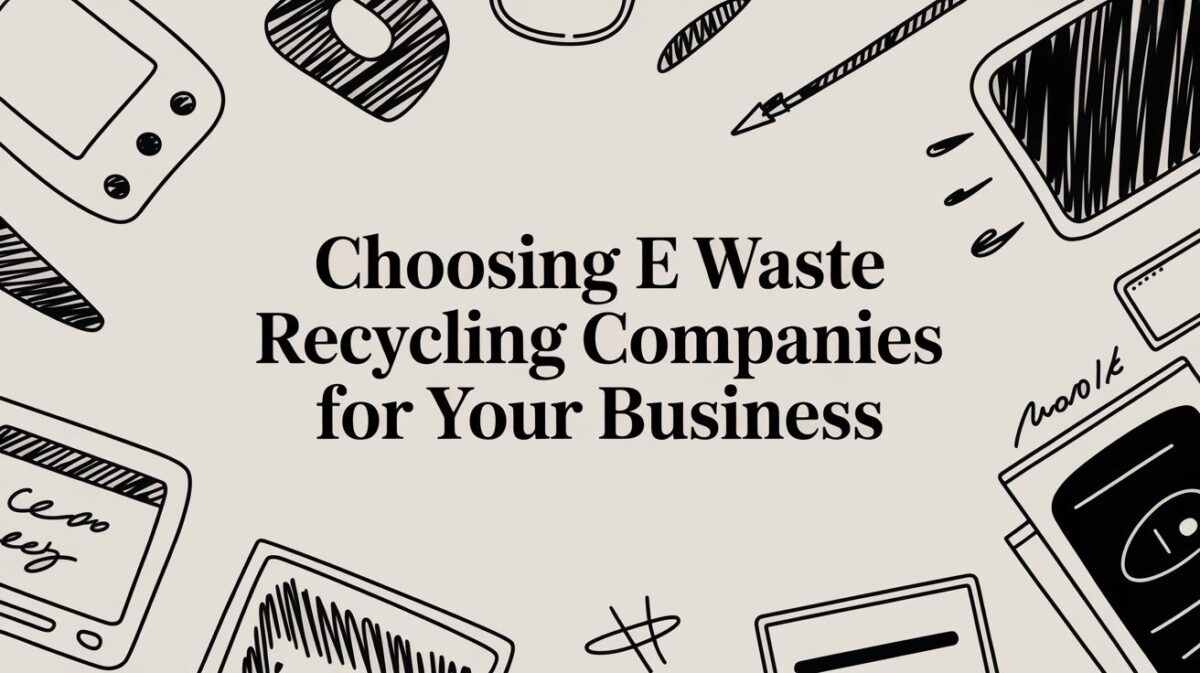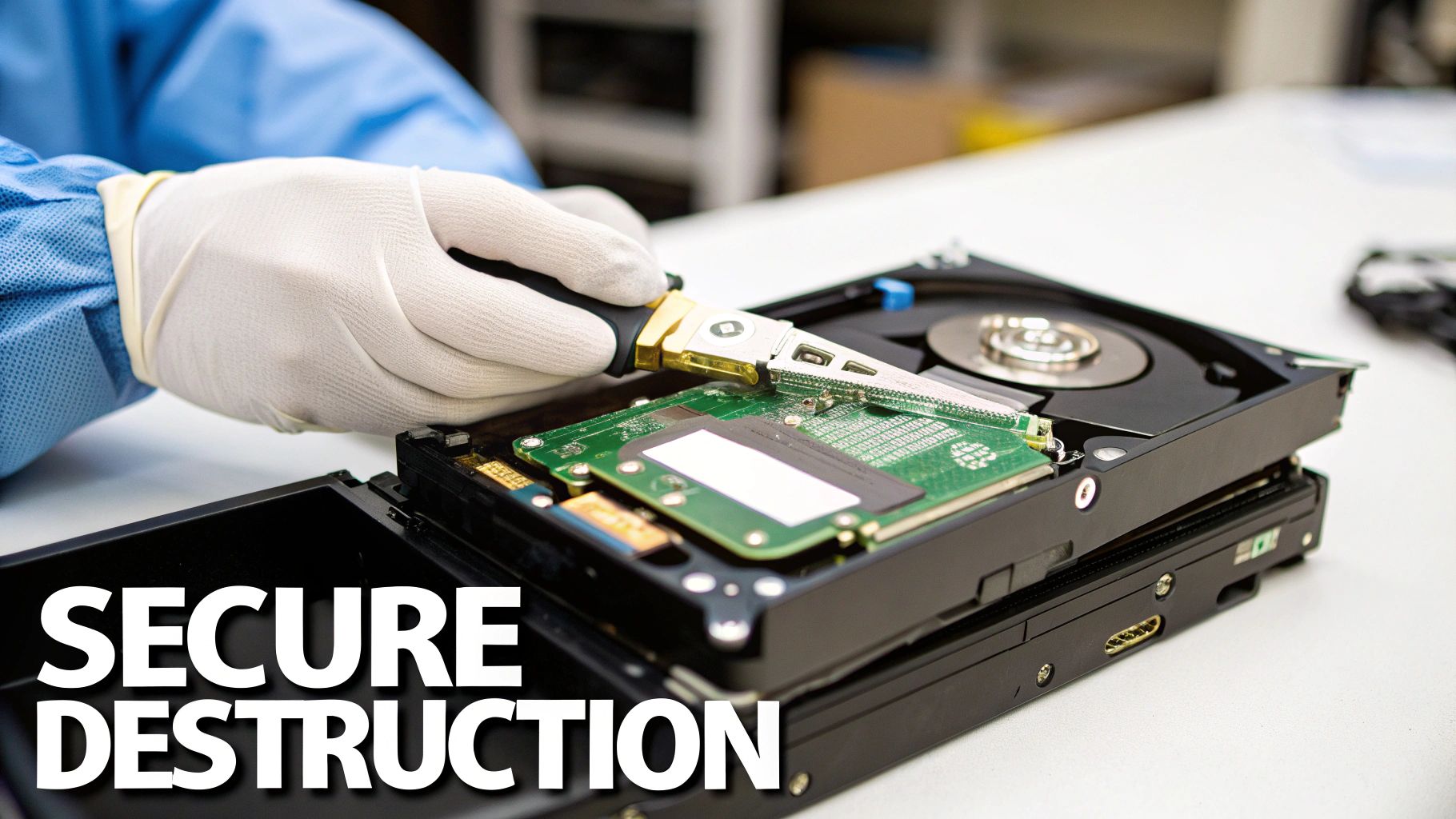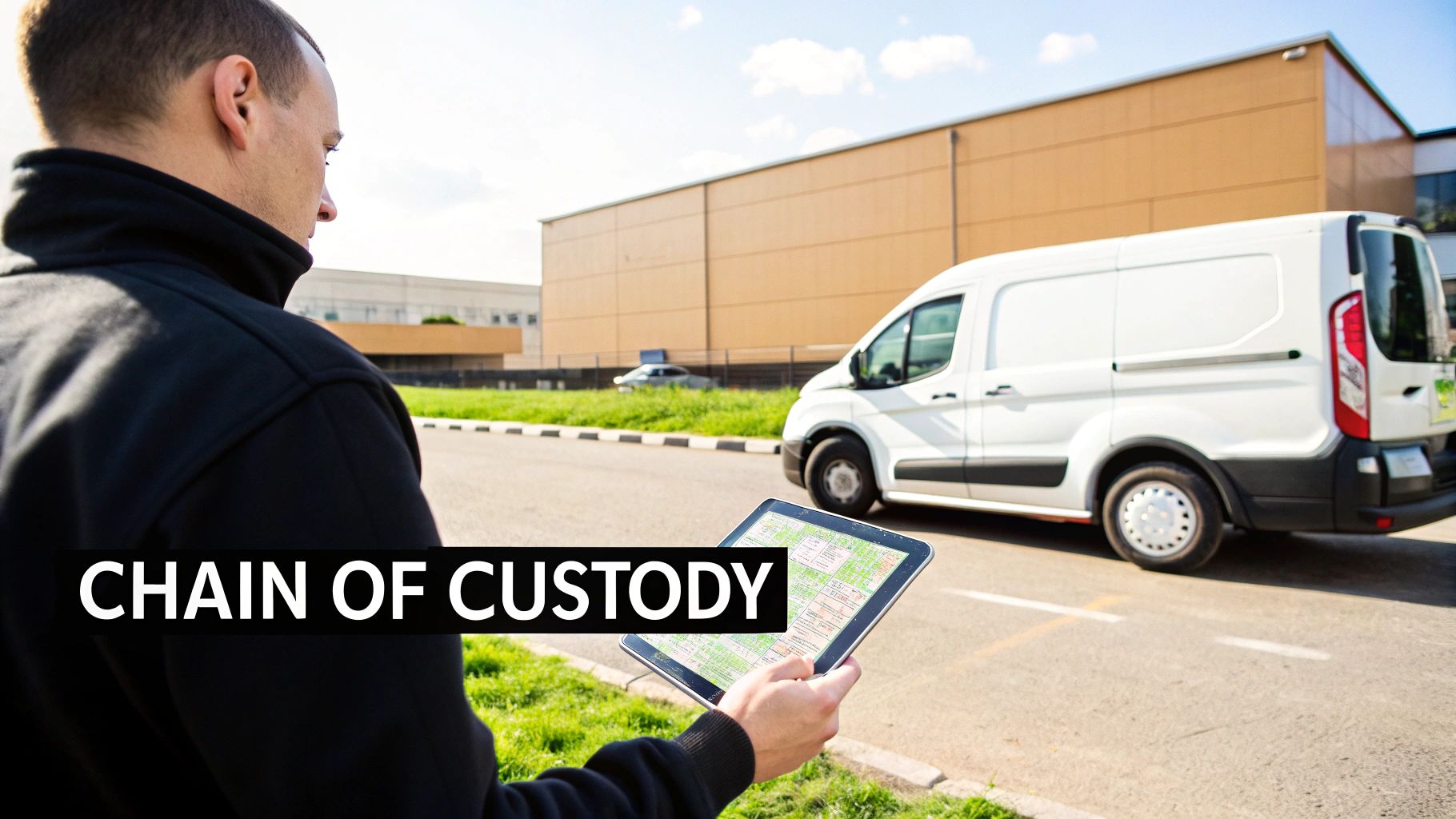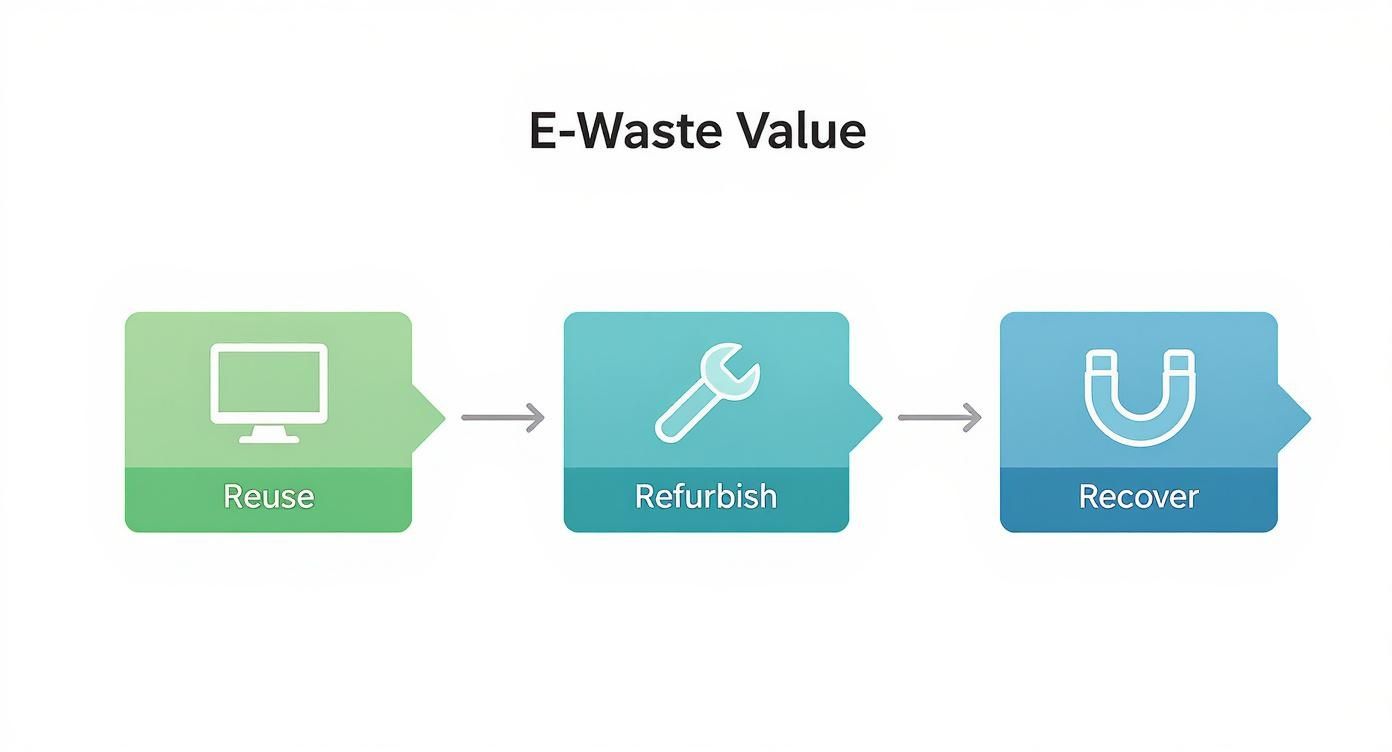Choosing E Waste Recycling Companies for Your Business

Picking the right e waste recycling companies is more than just an item on a checklist—it's a critical business decision that directly impacts your data security, brand reputation, and even your bottom line. Get it wrong, and you could be looking at a catastrophic data breach or steep regulatory fines. Get it right, and you'll strengthen your brand and meet your sustainability goals head-on.
Why Your E-Waste Partner Is a Strategic Decision
Not long ago, choosing an e-waste recycler was a simple facilities management task. Today, that decision has become a core business function. It’s a move that should involve your legal, finance, and marketing teams, not just the IT department.
The stakes have never been higher. A single hard drive that’s handled improperly can lead to a devastating data breach, exposing sensitive customer records or proprietary company information.
Think about the fallout: a healthcare provider hit with massive HIPAA fines because patient data was pulled from discarded computers. Or a financial firm that loses client trust forever after account details are leaked from retired servers. These aren’t just what-if scenarios; they are the real-world consequences of a poor partnership.
The Growing Risk and Responsibility
The sheer scale of the e-waste problem is staggering. In 2022, the world generated a record 62 million metric tonnes of electronic waste—an 82% jump from 2010. Even more shocking? According to the UN, only 22.3% of it was properly managed, a rate that’s expected to drop even lower. These numbers make one thing clear: businesses have an urgent responsibility to get this right.
This is where a true partner, not just a vendor, makes all the difference. A certified and transparent recycler doesn’t just offer disposal. They provide:
- Ironclad Data Security: They guarantee that all data is permanently destroyed according to strict industry standards, protecting you from liability.
- Regulatory Compliance: They help you navigate the tangled web of local, state, and federal regulations, keeping your business compliant and out of trouble.
- Brand Protection: Working with them shows a real commitment to environmental responsibility, boosting your public image and corporate social responsibility (CSR) profile.
When you reframe the selection process as a strategic alliance instead of a simple vendor choice, the focus shifts from just cutting costs to actively managing risk and creating value. The right partner isn't a cost center; they're an extension of your security and compliance teams.
From Tactical Disposal to Strategic Partnership
Let’s look at two real-world outcomes. One company went with a cheap, uncertified recycler to save a few dollars. A few months later, their branded equipment—with hard drives still full of data—was found in an overseas landfill. The result was a public relations nightmare and a costly data breach investigation.
Another company took a different route. They partnered with a certified recycler that provided detailed asset tracking and certificates of data destruction for every device. They highlighted this partnership in their annual sustainability report, which boosted their brand reputation and earned them major points with investors and customers.
This proactive approach turned their electronic waste recycling services into a positive marketing story. The only difference was that they treated the decision as a strategic imperative, not just an operational chore.
Navigating Certifications and Environmental Compliance
When you hand over your end-of-life electronics, you're not just getting rid of obsolete hardware. You're entrusting a partner with your company's sensitive data and its environmental reputation. Certifications aren't just fancy badges for a website; they are your proof that a recycler follows strict, third-party-audited standards for both security and sustainability.
Ignoring them? That's a risk no business can afford.
The first step is making sense of the alphabet soup of credentials—like R2, e-Stewards, and NAID AAA. Each one signals a different commitment and focus, letting you match a recycler’s qualifications to your company’s specific needs.
Decoding the Most Important Certifications
Let's be clear: not all certifications are created equal. In the world of e-waste, two standards stand out as the most respected: R2 and e-Stewards. They address slightly different concerns, but both are gold standards.
-
R2 (Responsible Recycling): Think of the R2 standard—especially the latest R2v3 version—as the all-around MVP. It's a comprehensive certification covering environmental, health, and safety practices. For most businesses, its most critical feature is the intense focus on data security, requiring certified recyclers to sanitize, purge, or physically destroy data on every single device.
-
e-Stewards: Born out of the environmental group Basel Action Network, e-Stewards is famous for its zero-tolerance policy against exporting hazardous e-waste to developing countries. It also includes rigorous criteria for data security and ensuring worker safety.
-
NAID AAA Certification: This one is a specialist. Its sole focus is data destruction. If your number one priority is ensuring that every last bit of sensitive information is obliterated beyond recovery, a NAID AAA certified partner is non-negotiable. It guarantees a secure, documented process from the moment your assets leave your building to their final destruction.
When you see a recycler holding multiple certifications, like both R2v3 and NAID AAA, it’s a strong signal of a deep, across-the-board commitment to doing things right. It shows they've invested in excellence for both environmental processing and data security.
Choosing a certified partner effectively moves the liability from your shoulders to theirs. It creates a documented, auditable trail proving you did your due diligence—a lifesaver if a regulator ever comes knocking.
Key E-Waste Recycling Certifications at a Glance
Navigating the world of e-waste certifications can feel overwhelming. This table breaks down the most important ones to help you understand what each guarantees for your business's security and compliance.
| Certification | Primary Focus | Key Benefit for Your Business |
|---|---|---|
| R2v3 | Comprehensive environmental, health, safety, and data security standards. | A holistic, globally recognized standard that covers the entire lifecycle of your IT assets, including data sanitization. |
| e-Stewards | Preventing illegal export of hazardous waste and ensuring ethical recycling. | Guarantees your e-waste won't contribute to environmental and health crises in developing nations. Strong ethical assurance. |
| NAID AAA | Secure and verifiable data destruction processes. | The gold standard for data security, providing proof that sensitive information has been irretrievably destroyed. |
Ultimately, the right mix of certifications depends on your specific risk profile and corporate social responsibility goals. A partner holding multiple top-tier certifications demonstrates a robust, multi-layered commitment to protecting your interests.
Moving Beyond a Simple 'Yes'
Just asking, "Are you certified?" is a starting point, not the finish line. You need to dig deeper to see how those certifications play out in their operations.
Smart questions will reveal a potential partner's true competence. For instance, instead of just confirming they have an R2 certification, try asking:
- "Can you walk me through your asset tracking process as required by the R2v3 standard?"
- "What documentation do you provide to verify data destruction in line with NAID AAA protocols?"
The confidence and detail in their answers will tell you everything you need to know.
Verifying a Recycler's Credentials
Sadly, "greenwashing"—where companies make misleading environmental claims—is a real problem. Don't just take their word for it. Always independently verify a potential partner’s certifications.
It’s easy to do. Just check the official online directories maintained by the certifying bodies, like the SERI website for R2 and the e-Stewards website. A few minutes of your time can save you from a major headache down the road.
Once the recycling process is finished, you should receive paperwork that serves as your final proof of compliance. To learn more about what to look for, read up on the importance of a certificate of destruction and what it must include. This document is your ultimate guarantee that your assets were managed correctly from start to finish.
Mastering Data Security and Secure Destruction
For any business, the sensitive information on retired devices is a much bigger liability than the hardware itself. When you’re vetting an e-waste partner, you must scrutinize their data destruction process. A misstep here can lead to truly devastating financial and reputational damage.
A one-size-fits-all approach to data security just doesn't cut it. The right method always depends on the kind of data you handle and the specific compliance standards you’re required to meet.
A healthcare provider disposing of laptops with patient health information (PHI) is bound by strict HIPAA guidelines, which require an auditable and totally irreversible destruction method. A marketing agency retiring older workstations has different, though still critical, security needs for its proprietary client data.
Comparing Data Destruction Methods
The best e waste recycling companies will offer several methods to destroy data, and knowing the difference is key to making the right call. Not all techniques are created equal, and ultimately, choosing the right one for your data type is your responsibility.
Here’s a breakdown of the most common and effective options out there:
- Data Wiping: This is a software-based approach that overwrites your data with random characters, making the original information impossible to recover. You'll want to look for vendors who use either the DoD 5220.22-M standard (a 3-pass wipe) or the more current NIST 800-88 guidelines. This method is ideal for devices you plan on remarketing or reusing.
- Degaussing: Using an incredibly powerful magnetic field, degaussing instantly and permanently wipes the data from magnetic media like old-school hard disk drives (HDDs) and tapes. It also renders the drive completely useless, making it a highly secure choice.
- Physical Shredding: For the ultimate peace of mind, nothing beats physical destruction. Industrial shredders grind hard drives, SSDs, and other media into tiny, irretrievable pieces. This is the go-to method for devices holding highly sensitive information or for media that’s broken or obsolete.
The most crucial takeaway is this: your data is your liability until it is proven destroyed. A simple verbal confirmation from a vendor is not enough—you need verifiable proof for every single asset you hand over.
The Certificate of Data Destruction: A Non-Negotiable Requirement
Once your media has been destroyed, any reputable recycler must provide you with a Certificate of Data Destruction (CoDD). This isn't just a receipt; it's your official legal record proving you’ve met your data security obligations.
A proper CoDD is far more than a piece of paper. It should include specific, auditable details that create a clear chain of custody. You need to insist that your certificate includes:
- A unique serial number for tracking.
- The exact destruction method used (e.g., NIST 800-88 Purge, physical shredding).
- A detailed list of the serial numbers for each individual hard drive or device.
- The date and location where the destruction took place.
- The signature of a witness who verified the process.
This document is your shield in an audit or legal battle. For any business managing sensitive data, looking into professional hard drive destruction services is an absolutely critical step. Without this detailed paperwork, you have no real proof your data was handled responsibly, leaving you wide open to significant risk.
Evaluating Logistics and Chain of Custody
How your retired IT assets get from your office to the recycling facility is a critical link in your security chain, but it's one that’s surprisingly easy to overlook. A vendor’s logistics process is every bit as important as their R2 or e-Stewards certification. If you don't have a secure and transparent chain of custody, you've got a major hole in your data security shield.
Think about it—the journey itself creates risk. Unsecured trucks, untracked routes, and undocumented handoffs are all open invitations for assets to go missing. It's exactly why top-tier e waste recycling companies provide a rock-solid process you can follow from beginning to end.
Securing Assets from Pickup to Destruction
A truly secure process starts the second the recycler shows up at your door. You should be looking for vendors that offer GPS-tracked transport. This isn’t just a nice-to-have feature; it's a fundamental security measure that lets you know where your assets are in real-time until they reach the secure facility.
That tracking needs to be paired with serialized asset management. Every single device—from a heavy server rack down to a single laptop—should get a unique serial number tag right at pickup. That number is then scanned and tracked at every single stage, creating a perfect, auditable chain of custody.
This level of detail is what guarantees nothing gets "lost" in transit. It’s also the backbone of the final, detailed report you’ll receive.
A strong chain of custody isn't just about moving boxes. It's about maintaining legal and security control over your assets even after they've left your physical possession. This documented trail is your proof of due diligence.
On-Site Services for Maximum Security
For any organization handling extremely sensitive data, the absolute most secure option is to destroy that data before it ever leaves your building. This is where on-site services are invaluable.
Ask potential partners if they offer services like mobile hard drive shredding. With this, a specialized shredding truck comes right to your location. You can witness your old hard drives and other media get turned into tiny pieces. It completely eliminates any chain-of-custody risk for your data because it's gone before the transport phase even begins.
Logistics for Every Business Scale
A recycler’s logistical muscle has to match your company's size and complexity. If your business has multiple offices spread out across the state, you need a partner who can coordinate complex, multi-location pickups without breaking a sweat.
Before you sign anything, dig in with some specific questions about their process:
- How do you manage pickups for a company with ten locations versus a single office?
- What’s your standard procedure for packing and securing our equipment on-site?
- Can you show me a sample report that tracks an asset by serial number from pickup to its final disposition?
Their answers will tell you everything you need to know about their experience and whether they can handle your specific needs. This whole process is one key part of a much bigger strategy, and it’s helpful to understand what is IT asset disposition to see how logistics fits into the full lifecycle of managing your technology securely and responsibly.
Finding Value Through Sustainability and Reuse
Modern e-waste management isn't just about disposal. It’s about being part of the circular economy. The best partners don’t see a pile of old computers; they see an opportunity to extend the life of that equipment, turning a line-item expense into a source of value for your business and the planet.
This whole approach follows a clear hierarchy. Reuse is king. After that comes refurbishment, and only then, materials recovery. Keeping a functional machine in circulation is always the smartest move, both for your bottom line and the environment.
The Hierarchy of Value Recovery
A forward-thinking recycling partner always leads with a sustainability-first mindset. They will first evaluate your retired assets for any resale value. You'd be surprised what's in demand on the secondary market—recent-model laptops, servers, or networking equipment are often perfectly suitable for a second life.
If a device isn't quite ready for immediate reuse, the next best thing is refurbishment. This could be something simple, like swapping out a faulty component, adding more memory, or even just cosmetic cleanup to make it marketable again.
Only when a piece of equipment is truly at the end of its useful life should it be broken down for materials recovery. This is the final step, where valuable commodities like copper, aluminum, and precious metals are responsibly extracted to be used in new products.
By putting reuse and refurbishment first, you’re not just shrinking your company’s environmental footprint—you’re opening up a potential revenue stream. This flips the script on IT Asset Disposition (ITAD), turning it from a cost center into a strategic financial win.
Turning Retired Assets into Revenue
The most capable e waste recycling companies will offer you a revenue-sharing program. It’s simple: when they successfully sell your remarketed equipment, you get a cut of the sale. This can seriously offset—or in some cases, completely cover—the cost of the recycling service itself.
The numbers don't lie. The global e-waste recycling market was valued at a massive $45.33 billion in 2023 and is on track to blow past $66.33 billion by 2029. That incredible growth just goes to show how much economic potential is locked away inside all those retired electronics. You can dig deeper into the expanding e-waste market and its opportunities.
To really know if a partner can deliver on this, you have to ask some direct questions about their process and how transparent they are.
Key Questions for Your Potential Partner
Before you sign anything, you need to get crystal clear answers on how they handle the value recovery side of things. If you get vague, hand-wavy responses, that’s a huge red flag.
Here’s exactly what you need to ask:
- Downstream Vendor Network: "Can you provide transparency into your network of downstream vendors for both remarketing and materials recovery?" A reputable partner will have no problem showing you their vetted network of certified buyers and processors.
- Reporting on Commodities: "What kind of reports will I get on the commodities recovered from our assets?" You should be looking for detailed breakdowns that itemize the types and weights of materials recovered, like steel, plastic, and copper.
- Revenue Sharing Model: "How does your revenue-sharing agreement work? What’s our percentage, and how is the final value of the equipment determined?" You want to see clear, transparent terms that spell out any fees and your net return.
- Donation Programs: "Do you work with any non-profits for equipment donations?" For assets that might not have a high resale value but are still perfectly usable, donation is a fantastic way to support community programs. For example, you can see how these programs work by learning how to donate a laptop.
Getting solid, confident answers to these questions is how you ensure you find a partner who not only helps you hit your sustainability goals but also maximizes the financial return on your old IT assets.
Making Your Final Decision
You’ve done the legwork—you’ve vetted certifications, grilled potential partners on data security, and reviewed their sustainability reports. Now it's time to pull all that information together and make a choice. This isn’t just about finding a disposal service; it’s about selecting a strategic partner who can protect your business from significant risk.
The key is to weigh each factor based on what matters most to your organization. A healthcare provider, for instance, has to put HIPAA-compliant data destruction at the very top of the list, making a NAID AAA certification a deal-breaker. On the other hand, a tech startup with newer, high-value equipment might prioritize a partner with a strong IT asset remarketing program to recoup some costs. It's all about aligning their strengths with your specific needs.
Structuring a Smarter RFP
A well-crafted Request for Proposal (RFP) is your best friend here. Forget generic, checkbox-style questions. You need to ask scenario-based questions that force vendors to show their work and reveal their true capabilities.
Try asking things like:
- Data Security: "Walk us through your exact process for a batch of 100 laptops containing protected health information, from the moment you pick them up to the moment we receive the Certificate of Destruction."
- Logistics: "Outline your plan for a three-location pickup across the metro area. How do you maintain the chain of custody and track every asset?"
- Value Recovery: "Can you provide a sample report that details the remarketing value and commodity recovery for a pallet of mixed IT equipment?"
The level of detail and transparency you get back will tell you everything you need to know. It quickly separates the true e waste recycling companies from the amateurs.
A critical red flag is vagueness. If a potential partner can't give you clear, documented answers about their downstream vendors, data destruction methods, or chain of custody, it's time to walk away. Your data and reputation are far too valuable for ambiguity.
The best partners always look for ways to maximize the value of your old equipment, which is better for your bottom line and the planet. This hierarchy is a great way to visualize it.
When you're comparing the final proposals, use a simple scoring matrix to keep things objective. Assign a weight to each category based on your priorities—maybe security gets 40%, compliance 20%, logistics 20%, value recovery 10%, and cost 10%. This simple step removes gut feelings from the equation and helps you clearly identify the partner that truly aligns with your organization's goals.
When your Atlanta-based business needs a trusted partner for secure and sustainable IT asset disposition, turn to Atlanta Computer Recycling. We provide certified data destruction, responsible recycling, and transparent logistics to protect your company and your reputation. Get in touch with us to handle your e-waste needs at https://atlantacomputerrecycling.com.



